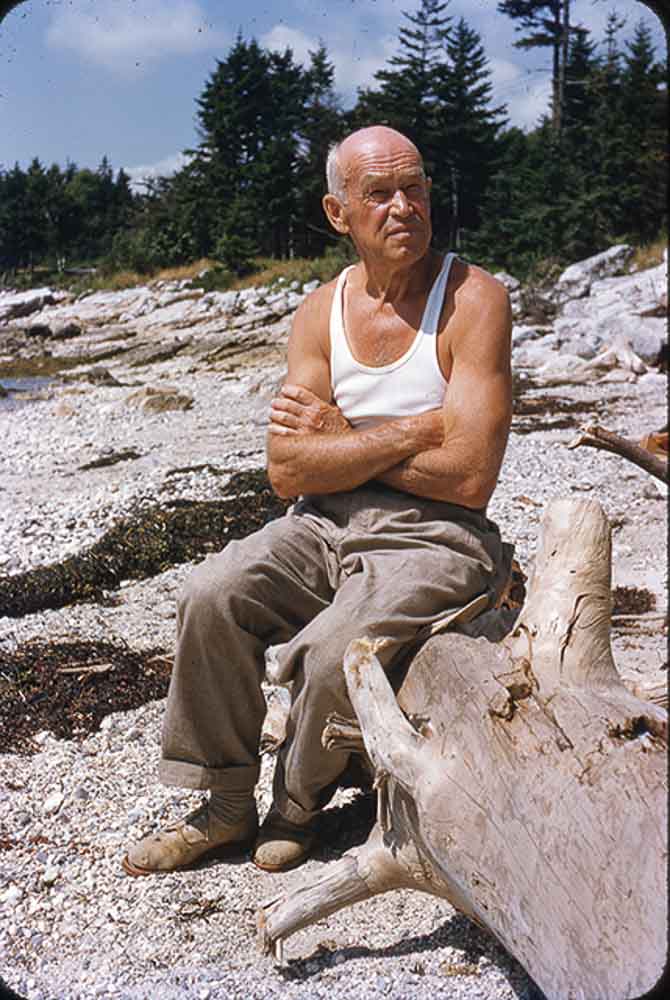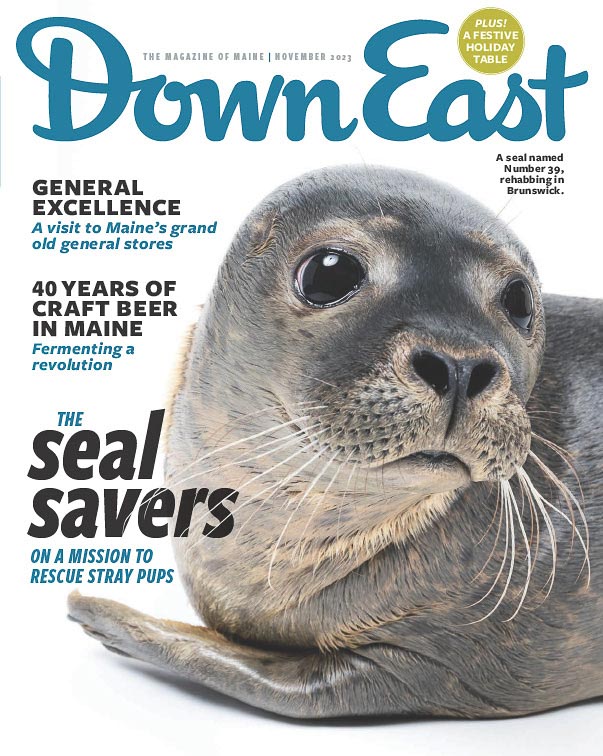By Michele Christle
Photos by Derek Yorks
From our August 2023 issue
Frank Kilburn was a professor of natural history and ornithology at the Washington State Normal School — what’s now the University of Maine at Machias — for 25 years. After he retired, in 1949, he set about carving birds, then painting them and mounting them on driftwood. Quite a few were displayed on campus, in a building the school named for Frank. His family estimates he carved between 800 and 1,000 in all. He gifted some to relatives and some to friends, and he sold others, for $12 apiece, to souvenir stores along Route 1. By the time Frank died, in 1978, many of the birds had flitted off to faraway homes.
Jeff Yorks, Frank’s grandson, is my father-in-law, as well as a tinkerer, artisan, and itinerant carpenter with a penchant for collecting. In his 66 years, he’s bought and sold hundreds of antique cars, trucks, motorcycles, boats, and bicycles. He goes through stretches where he’ll spend hours a day on Craigslist, Facebook Marketplace, and eBay. Every home he’s ever lived in has had a small flock of Frank’s birds on display.



Yorks’s growing collection of carvings by his grandfather, Frank Kilburn.
One morning last year, Jeff typed “F.M. Kilburn bird carvings” into the search bar. Five results popped up, from a seller in Windham. He bought them for about $130. A month later, the same seller listed a pheasant and a kingfisher, and Jeff added those to his collection too. “The guy wouldn’t tell me where he got them from,” Jeff says, “he was very elusive.” From then on, he was determined to track down as many of his grandfather’s birds as he could.
Jeff was raised in a neat, suburban home in Rhode Island, but he spent long stretches in Maine with his grandparents, especially after his sister, Dena, died of complications from a heart problem, at just 16. His grandparents’ 100 acres in Waldoboro were perfect for hunting squirrels and disassembling and reassembling old lawn mowers. If Jeff asked his grandfather for nails, Frank would tell him to yank some out of their old icehouse with a crowbar. More likely than not, Frank could be found at his workbench, wearing his jackknife down to a nub as he whittled.
“My grandfather was stern,” Jeff says, “As a little kid, I didn’t think he really liked me. But now, I think he got me a lot better than my parents even did. He knew I liked to work with my hands, that I like to be out in the woods, that I didn’t want to be a car salesman or an insurance actuary or whatever.”


Frank Kilburn, pictured sitting at the beach and walking through his Waldoboro garden alongside a much younger Yorks. Photos courtesy of Jeff Yorks
Jeff is capable of living off seemingly nothing. He’s been divorced since 1997, and he’ll go long spells not communicating with anyone. He can build houses, make jewelry, write songs. When his Pomeranian, Tina Turner, broke her leg, he fashioned her a splint. He turns scrap into children’s toys. He values handmade things. One of his grandfather’s chickadees cost him less than a six-pack of beer. “To me, that’s just awful,” he says. “But sometimes I’ll see them at auctions where they’ll go for three or four hundred a bird. My biggest fear is that people would have, like, 10 of these birds and sell them at a yard sale for a buck apiece. I tend to look at objects like they’re alive. That’s just the way I am.”
Jeff still splits time between Rhode Island and Maine — he built himself a cabin in Farmington 11 years ago. After Tina Turner died, last fall, Jeff put up two bird feeders. In the evening, he washes the dishes in his outdoor kitchen and listens to Kool & the Gang, Lil Yachty, and Herb Alpert (his taste in music, as in objects, is eclectic). Then, he likes to sit on his deck and watch the wildlife. He’s the only one in his Farmington neighborhood who doesn’t have a lawn, his little cabin nestled among suburban-style homes.

One day this spring, he’d just learned what it would cost to have a new well drilled and was debating which of his collected cars he’d sell to cover it. He doesn’t mind so much if the cars come and go, but F.M. Kilburn’s birds are a different matter. Now, 59 of them — owls, warblers, jays, and many more — are scattered across the table in his cabin. His searching recently turned up a red-tailed hawk his grandfather carved, but he was too late to buy it. It had already sold at auction.
“These birds are like family members to me,” Jeff says. “I think about the others that are out there, and I’m like, they just need to stay with their family.” He hopes he might eventually find a permanent home for the birds, somewhere they could be on public display. “I don’t want to split them up when I die,” he says. “I’d like them to stay together.”
Wondering if a bird carving in your possession was made by Frank? Email a pic for confirmation here.


